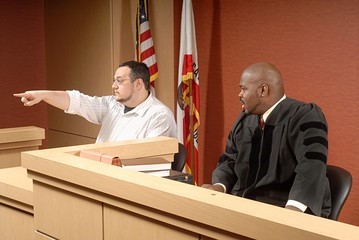There are many moving parts in a white collar or federal criminal investigation. Although people may be approached by the FBI or called to testify before a grand jury, not all parties interviewed are witnesses.
A federal criminal investigation must follow a specific discourse throughout its duration. The people coming forward fall into one of three categories:
- Witness
- Subject, or
- Target
It is imperative to know the definition and to know your status of what each category represents. But what is the difference between them?
Here is the difference between a target, subject, and witness classification for the FBI and United States attorney’s office investigation:
What is a Target?
A target is found in the label “target of an investigation.” A “target” is a person to whom the prosecutor or the grand jury has substantial evidence linking them to the commission of a crime and who, in the prosecutor’s judgment, is a putative defendant. Any person deemed a target has critical evidence linking them to the commission of a crime. The prosecution names a person a target only when they are ready to bring forth criminal charges. Therefore, when a target is identified, this person should take an opposing stance against the prosecution. This can include the Fifth Amendment—the right against self-incrimination.
When a target is identified, it shows a clear warning of the person’s criminal exposure.
What is a Subject?
A subject of an investigation is very specific with its definition and sits at the other end of the spectrum. The legal definition can be found in the DOJ Handbook. A “subject” is defined as:
“A person whose conduct is within the scope of a Grand Jury’s investigation.”
This classification falls between a target and a witness. A subject in some way engaged in conduct that may have appeared unethical or suspicious. The prosecution may believe they have engaged in a form of illegal behavior. However, the prosecution may not have the proper evidence to indicate that their involvement can be proven as a committed crime.
The prosecution will want to conduct further investigations in order to prove or disprove there was a provable crime that occurred.
What is a Witness?
Against popular belief, being a witness in a case involving the FBI, IRS, or even the Secret Service does not necessarily mean that you literally saw the crime happen. You may possess essential information that will assist law enforcement in proving the accused party’s innocence or guilt.
Being a witness can confirm or deny the charges against the accused. In most cases, the prosecution does not deem the witness as a potential accomplice in committing the crime—but it can happen. Responsibility in a case can be on the lower end; therefore, most witnesses cooperate with investigators and can be willing to testify in a grand jury or at trial.
As a witness, nothing you say can be protected without immunity or a proffer agreement. If you misspeak or provide inaccurate information, you can be charged with crimes of obstruction of justice, lying to federal agents, false swearing, or perjury. These charges carry hefty punishments, fines, and possible jail time—up to 5 years in federal prison.
Am I Protected?
Understand that no matter your classification, you are not offered protection in any criminal case absent a formal cooperation agreement or immunity. There is no guarantee that your classification will not change. Having a reputable attorney by your side is important to guide you through your specific classification and the legal process. Since no classification offers you protection of any sort, your attorney should create a legal strategy to keep you as safe as possible as you testify in court.
The prosecution does not have to detail which classification you fall under—by law. The DOJ mandates that the prosecution inform a target or subject of their legal rights should they have to testify in front of a grand jury. When classified as a target in a grand jury investigation, they receive a ‘target letter’ detailing their classification and their rights.
No Interview Without Proper Legal Representation
Never submit to an interview without an attorney with you. You may assume you are innocent, but one wrong move can land you a criminal charge or be criminally exposed. Federal agents analyze and break down every statement you make that surrounds their investigation, looking to prepare the case for prosecutors. You may incriminate yourself.
Factual mistakes are easy to make, especially when being interviewed by an intimidating federal officer or investigator. You do not want to appear involved in any criminal activity. Your attorney should help you create a strategy that will keep you safe from making mistakes in relaying the facts or misspeaking. Agents will be looking for inconsistencies—and you can be charged.
Hire a Criminal Attorney
Hire an attorney before discussing anything with the prosecution, Federal agents, or any involved law officials. You have a right to protect yourself and consult with an attorney before making statements.
Criminal defense attorneys at The Bianchi Law Group, LLC are all former prosecuting attorneys.
Now, as successful defense attorneys that pave the path in successful and proven defenses, they are ready to discuss the details of your case. Combing a teamwork strategy and excellent legal defense, you can rest assured that your right will be protected.
Call The Bianchi Law Group today to discuss the nature of the case.












